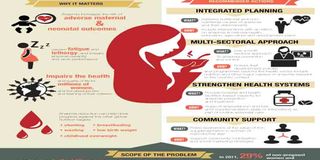Mothers and babies set to benefit from better nutrition

An infographic showing the burden of Anaemia in women and importance of iron nutrient in their diet. INFOGRAPH |WHO
What you need to know:
- The five year project, launched in Dodoma on Wednesday last week, is supported by a Canadian-based organisation, Nutrition International. The main implementing partner in Tanzania is AMREF and the Tanzania Food and Nutrition Centre (TFNC).
- Speaking during the launch in Dodoma, the Minister of Health, Community Development, Gender, Elderly and Children, Ms Ummy Mwalimu said that the initiative is very relevant in contributing to Tanzania’s current national development agenda.
Over 680,000 people in two regions—Mwanza and Simiyu, are set to benefit from a Sh4.7billion project known as ‘Right Start’, which aims at boosting nutrition services.
The five year project, launched in Dodoma on Wednesday last week, is supported by a Canadian-based organisation, Nutrition International. The main implementing partner in Tanzania is AMREF and the Tanzania Food and Nutrition Centre (TFNC).
Speaking during the launch in Dodoma, the Minister of Health, Community Development, Gender, Elderly and Children, Ms Ummy Mwalimu said that the initiative is very relevant in contributing to Tanzania’s current national development agenda.
She added, “This will inevitably make a significant contribution to our country’s efforts in fighting malnutrition, but also build a strong workforce to support our national industrialisation agenda.”
Reports by Nutrition International show that the Right Start project is expected to reduce anaemia, neonatal mortality, as well as the number of low birth weight newborns. It also seeks to reduce stunting in children under five years old.
“We believe investing in nutrition also means investing in the future. Well-nourished adolescent girls are better able to get an education. Well-nourished women have safer pregnancies, healthier children and are more productive members of the workforce,” said Joel Spicer, President and CEO of Nutrition International.
Over 130,000 pregnant women will receive a recommended amount of iron and folic acid supplementation, with more than 90,000 newborns set to receive a package of the interventions at birth.
Another group of 94,000 adolescent girls will be receiving a weekly iron and folic supplementation and nutrition education, and up to 366,000 children less than two years old will get nutrition services.
Tanzania is said to be making some progress towards reaching the World Health Assembly targets for stunting and wasting.
“While Tanzania is making progress towards ending malnutrition, there still is a lot of work to be done, especially for women and adolescent girls, and we are proud to contribute to these efforts through our support to Nutrition International’s Right Start Initiative,” said His Excellency Mr. Ian Myles, High Commissioner for Canada in Tanzania.
However, 45 per cent of women of reproductive age are still suffering from anaemia and 57 per cent of pregnant women. About 59 per cent of children below six months of age are exclusively breastfed and 34 per cent of children under five are stunted.
This, according to experts, can have long-term impacts on their physical well-being, their cognitive development and performance at work or school, and economic productivity in adulthood.
In Kenya
A similar program also launched in Kenya targets women and girls in nutrition supplement drive.
According to Daily Nation, the government of Kenya will improve the nutrition of adolescent girls in nine counties through weekly iron and folic acid supplementation and nutrition education.
By increasing the availability of commercial maize flour fortified with iron and folic acid, the government hopes to reach nearly one million adolescent girls and women of reproductive age.
An estimated 810,000 adolescent girls living in the nine targeted countries will receive weekly iron and folic supplementation and nutrition education through multiple platforms such as schools, private health facilities and communities, with the aim of reducing iron deficiency anaemia by 10 per cent.




